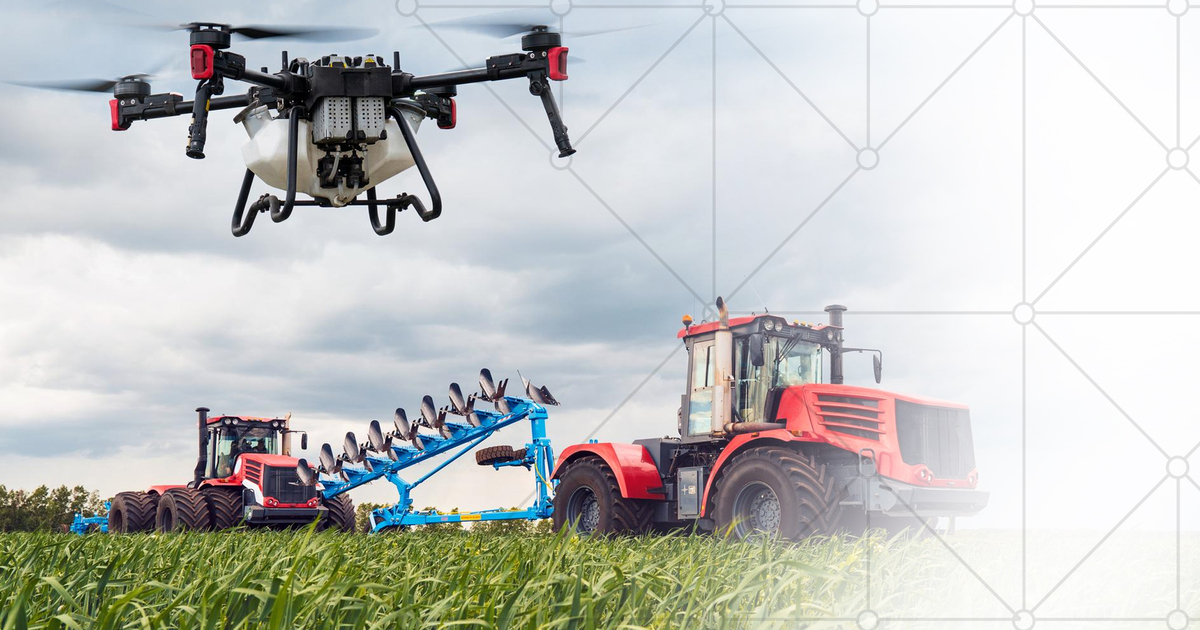Agriculture is facing some of its greatest challenges and changes as a result of climate change, particularly in countries where emissions exceed the global average.
Did you know that agriculture is responsible for 12% of global annual greenhouse gas emissions (7.1 Gt CO2 equivalent)? Combined with the deforestation of huge areas for farming, agriculture is a major contributor to climate change.
Interestingly, while being a catalyst for climate change, this sector faces dramatic challenges brought about by unstable weather and changing climate patterns.
Fortunately, the technologies used in farming, although rather slow-developing, are nevertheless progressing toward a more sustainable path. The advent of electric machinery, combined with research and the introduction of different types of fertilizers, which are both targeted at decreasing agriculture’s carbon footprint, are ushering in a new phase of farming.
Transformation in agriculture is made possible by a huge amount of research and development activities undertaken by scientists and experts. One critical link that drives agriculture forward is the connection between farmers and these experts.
The Rise of Electric Machinery in Agriculture
Electric machinery includes a broad spectrum of equipment used in agricultural operations, such as soil management and fieldwork (cultivation), shipping, irrigation, planting, and harvesting. Moreover, one of the most recent developments in electric farm machinery is the integration of cutting-edge automation and communication technology.
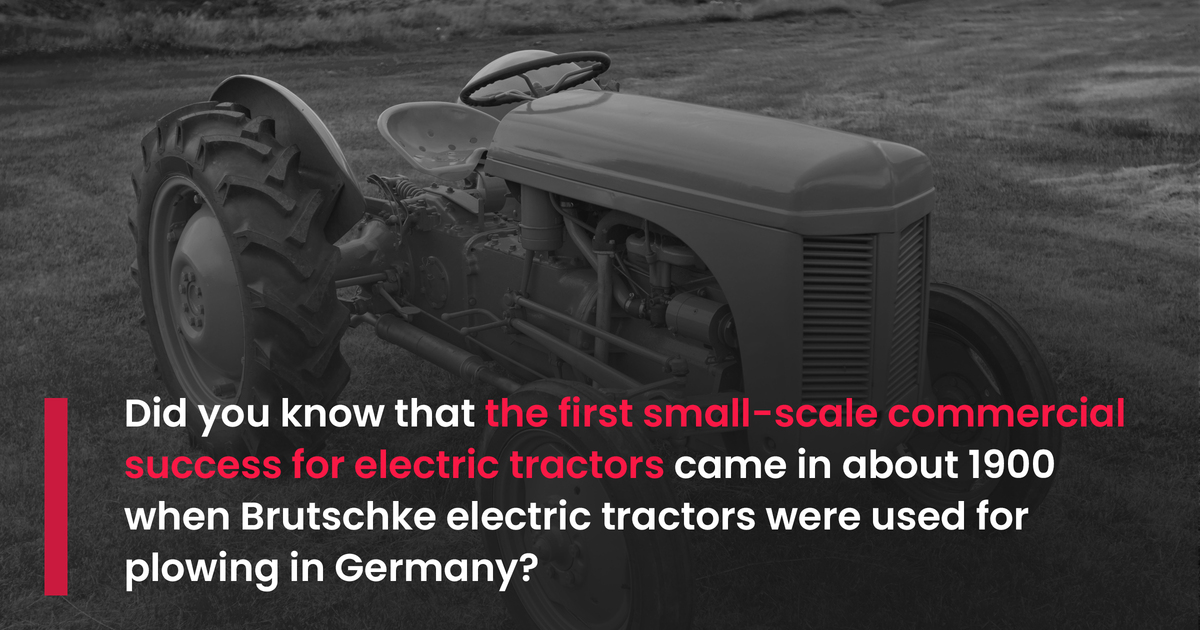 The agricultural industry is adopting electric machinery for several reasons, one of which is the growing demand for environmentally friendly farming methods and the necessity to reduce carbon emissions.
The agricultural industry is adopting electric machinery for several reasons, one of which is the growing demand for environmentally friendly farming methods and the necessity to reduce carbon emissions.
However, the adoption of electric vehicles in agriculture is still relatively slow, despite offering several important advantages, such as lower fuel costs and less maintenance being required due to the fewer parts in the engine.
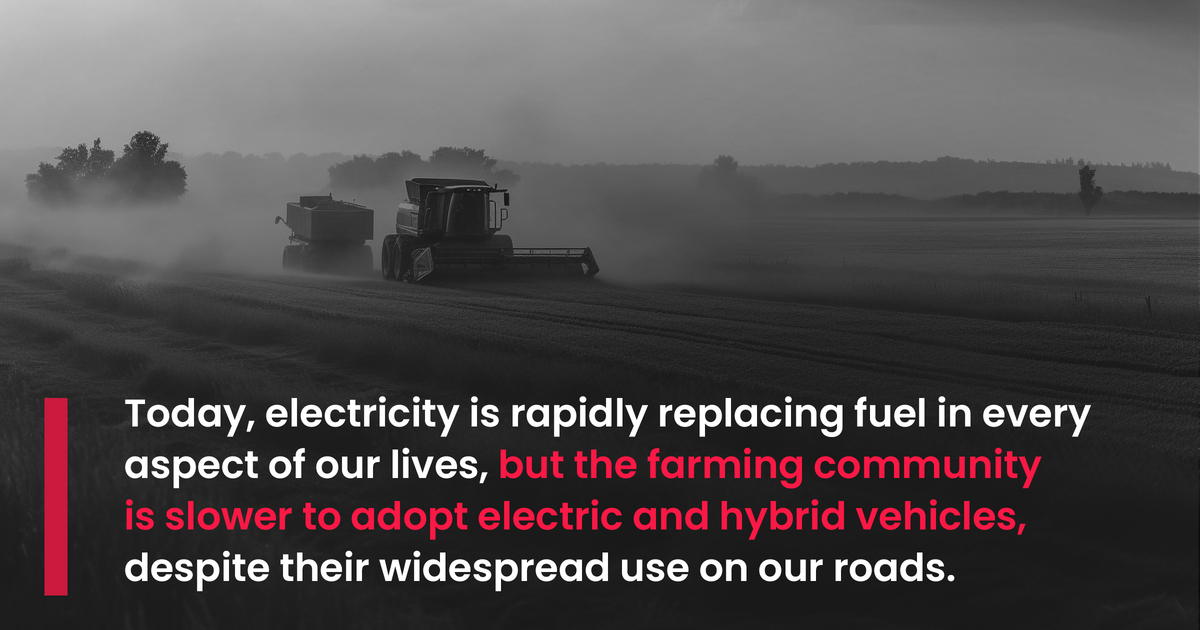 One of the main issues with electric tractors is their short battery life. Their slow adoption is partially due to the fact that they need more power to pull and push heavy weights and to operate for longer than most cars, which requires a larger battery capacity that is more expensive.
One of the main issues with electric tractors is their short battery life. Their slow adoption is partially due to the fact that they need more power to pull and push heavy weights and to operate for longer than most cars, which requires a larger battery capacity that is more expensive.
Amid the slow adoption of electric machinery, another revolutionary instrument is making great strides in agriculture, and that is drones.
The Role of Drones in Agriculture
In modern agriculture, drones are used for multiple purposes, from spraying pesticides and fertilizers to harvesting and recording every aspect of crop development.
According to experts, drones will contribute significantly to agriculture’s sustainable future, even though they will not completely replace large farm equipment.
- Drones are advancing very quickly due to their lower costs compared to some traditional heavy machinery and greater efficiency. For example, farmers can significantly reduce spraying and irrigation costs by making better-informed choices regarding these processes based on data collected by unmanned aerial vehicles (UAVs).
- Using UAV-collected data, with the help of artificial intelligence, farmers can spot problems in fields that could otherwise go unnoticed. All data collected by drones is uploaded to a platform where further analysis can be carried out.
- Drones outperform traditional equipment in terms of speed, waste reduction, land utilization, sustainability, and overall crop yield.
Drones can pinpoint areas that need intervention, thus helping farmers to understand where to apply fertilizers. This precision improves fertilizer effectiveness and lowers the risk of environmental damage, aligning with the greater goals of sustainable farming.
Why Use Eco-Friendly Fertilizers?
Fertilizers are essential to agriculture because they increase crop yields and ensure higher rates of food security for the world’s expanding population. However, conventional fertilizers do have certain drawbacks. Although they are necessary for plant growth, they can also have negative effects on the environment, such as the release of powerful greenhouse gases, nitrous oxide, or water and soil pollution.
However, eco-friendly fertilizers with a lower carbon footprint are emerging in the agricultural sector as a solution to these issues. These novel products are designed to decrease the loss of nitrogen into the environment, which, in turn, lowers greenhouse gas emissions.
Furthermore, bio-based fertilizers, which are made of natural substances, including plant extracts, are gaining popularity. In addition to providing plants with the nutrients they need, these products improve the overall condition of the soil, increasing its capacity to store carbon and slowing down global warming.
Combining Electric Machinery and Eco-Friendly Fertilizers
The use of electric machinery combined with environmentally friendly fertilizers represents a comprehensive approach to sustainable agriculture. However, it is important to address the issue of short battery life, as well as the further recycling of such batteries, which would further encourage the adoption of electric vehicles (EVs), tractors, and other electric machinery.
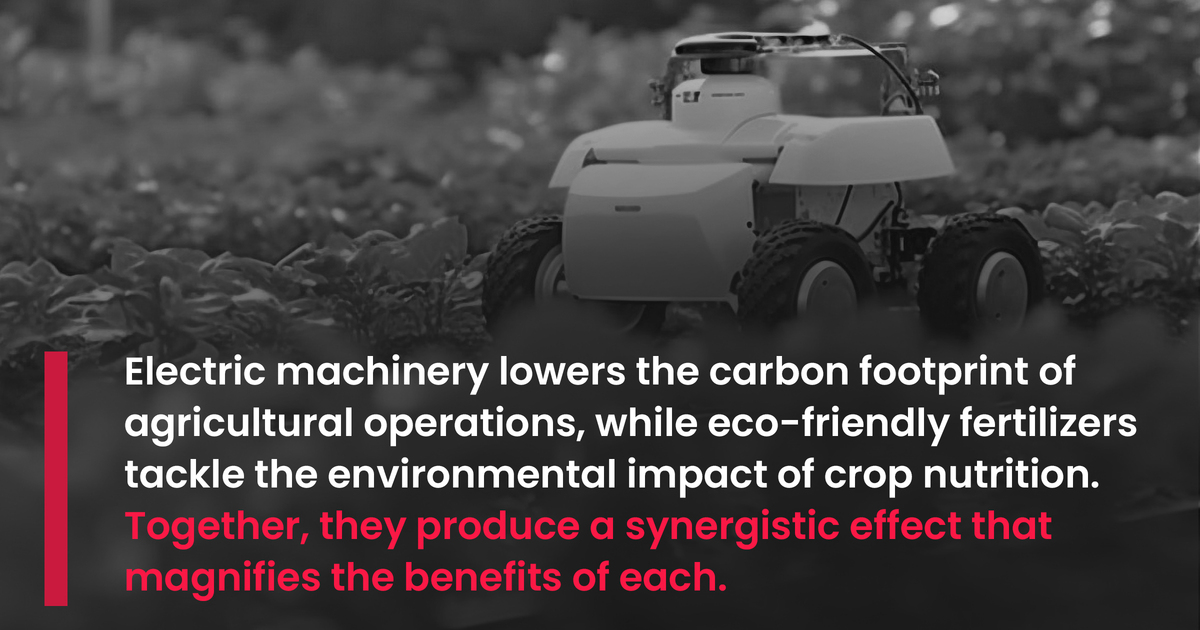 In order to minimize excessive use and nutrient runoff, it could be beneficial to promote technologies such as precision farming practices. These practices allow farmers to apply fertilizers more precisely and efficiently by, for example, using drones. This level of accuracy reduces waste and ensures that crops receive the correct amount of nutrients at the right time, in turn adding to the environmental benefits of eco-friendly fertilizers.
In order to minimize excessive use and nutrient runoff, it could be beneficial to promote technologies such as precision farming practices. These practices allow farmers to apply fertilizers more precisely and efficiently by, for example, using drones. This level of accuracy reduces waste and ensures that crops receive the correct amount of nutrients at the right time, in turn adding to the environmental benefits of eco-friendly fertilizers.
The Economic and Social Implications
While electric vehicles may require a higher initial investment compared to conventional tractors, long-term savings in fuel expenses and maintenance can make this financially viable.
Similarly, while eco-friendly fertilizers (biofertilizers, algae-based fertilizers, slow-release fertilizers, etc.) may be more expensive, their positive effects on soil health can increase crop yields and quality, making the initial expense worthwhile.
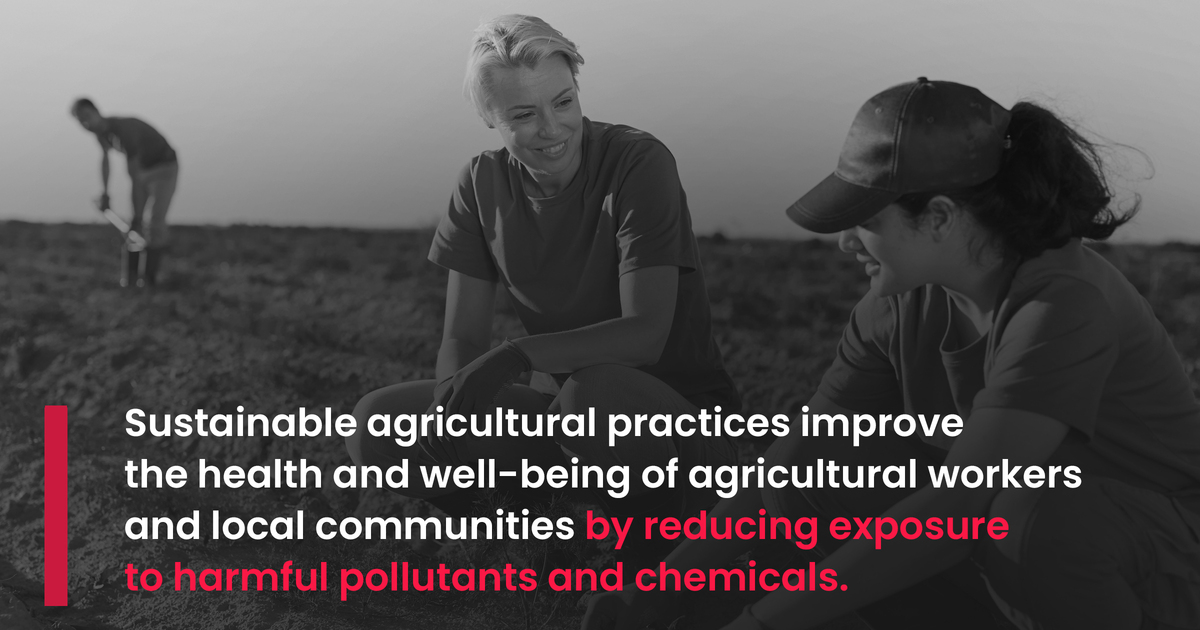 Sustainable agriculture also plays an important role in ensuring food security by strengthening agricultural resilience to harsh weather events.
Sustainable agriculture also plays an important role in ensuring food security by strengthening agricultural resilience to harsh weather events.
Expert networks’ role in agriculture transformation
Expert networks such as RightAngle Global connect companies and individuals with subject-matter experts, including CEOs, academics, researchers, and developers, who are at the forefront of agricultural technology and sustainable farming techniques. Insights from these professionals can contribute to advances in farming, including developments in agricultural machinery design and eco-fertilizers.
RightAngle Global has extensive expertise in diligently recruiting seasoned professionals within the agricultural sector, boasting diverse expertise in operations, finance, procurement, energy solutions, and research and development.
We find experts who are adept at discussing the utilization of electric machinery and eco-fertilizers from a multitude of vantage points. These experts could include manufacturers of agricultural equipment or organic fertilizers, reputable repair centers or workshops, as well as Agri OEM dealerships. For more information, contact RightAngle Global.
Final word
In the agricultural sector, the switch to electric machinery and the wide adoption of drones and biofertilizers is a journey, not a sprint. Farmers, agricultural businesses, policymakers, and consumers must remain committed to this transition. To facilitate this transformation, research and development, education, and training, as well as financial incentives, are essential.
Suggested reading:
Key Expert Network Trends in 2024: Insights from RightAngle Global
How Expert Networks are Transforming the Energy Sector. Case Studies
How Expert Networks Can Help Companies Keep Up With Industry Trends
Share to

